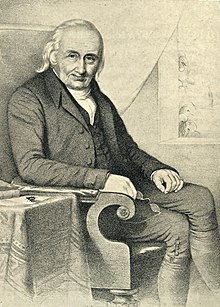William Kirby

Reverend William Kirby (born September 19, 1759 in Witnesham , England , † July 4, 1850 in Barham , Suffolk ) was an English entomologist and priest .
Live and act
Kirby received his training as a minister at Ipswich and Caius College , Cambridge , which he graduated in 1781. In 1782 he was assigned the rural parish of Barham in Suffolk , where he lived and worked in the remote village until the end of his life.
In his spare time he devoted himself to nature research, especially entomology . His first major work was the Monographia Apum Angliae (1802), a multi-volume treatise on the bees of his homeland. This work, the first to deal exclusively with this group of animals, set new standards in scientific work. Based on the Linnaeus systematics, he described a multitude of new species, which he described in a surprisingly precise and detailed manner compared to the limited possibilities of his time. He only introduced a new genus to Linnaeus' genus Apis ( Melitta for the short-tipped bees), but already grouped his species in a way that largely still exists in the form of today's genera. This work brought him great prestige in the professional world at home and abroad.
Together with his friend William Spence from Hull , he wrote the four-volume work Introduction to Entomology (1815-1826), the first popular science book on insects in English. In this work, a detailed account of entomology, Kirby also introduced a classification system based on the work of William Sharp MacLeay . In 1830 he was selected to write one of the Bridgewater Treatises ; his subject was The Habits and Instincts of Animals with reference to Natural Theology .
In addition to these books, he authored numerous writings in the treatises of the Linnean Society of London , the Zoological Journal and other journals; he contributed the sections on insects to the works Account of the Animals seen by the late Northern Expedition while within the Arctic Circle (1821) and Fauna Boreali-Americana (1837).
Because of his contributions to the scientific work in entomology and the popularization of this science, Kirby is also known as the "father of entomology". His collections are kept in the British Museum and by the Linnean Society .
Kirby also published the theological writings Strictures on Sir James Smith's Hypothesis respecting the Lilies of the Field or our Savior and the Acanthus of Virgil (1819) and Seven Sermons on our Lords Temptations (1829).
Web links
- Literature by and about William Kirby in the WorldCat bibliographic database
- Works by and about William Kirby in the German Digital Library
| personal data | |
|---|---|
| SURNAME | Kirby, William |
| BRIEF DESCRIPTION | English pastor and entomologist |
| DATE OF BIRTH | September 19, 1759 |
| PLACE OF BIRTH | Witnesham , England |
| DATE OF DEATH | 4th July 1850 |
| Place of death | Barham , England |